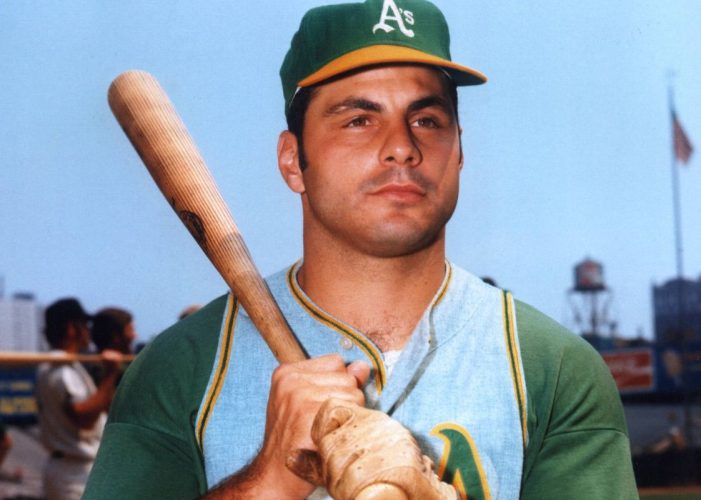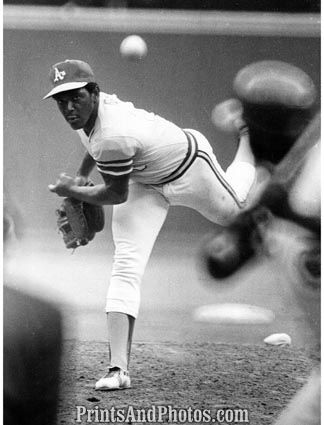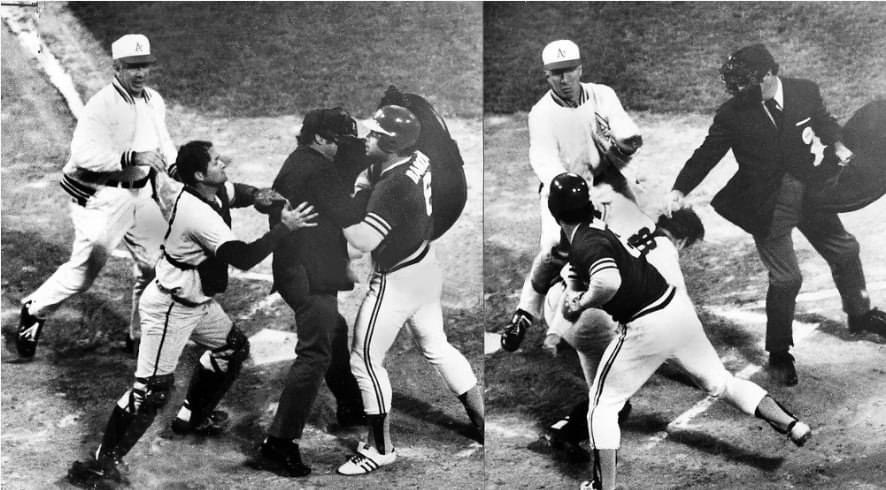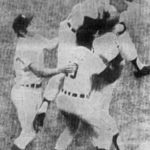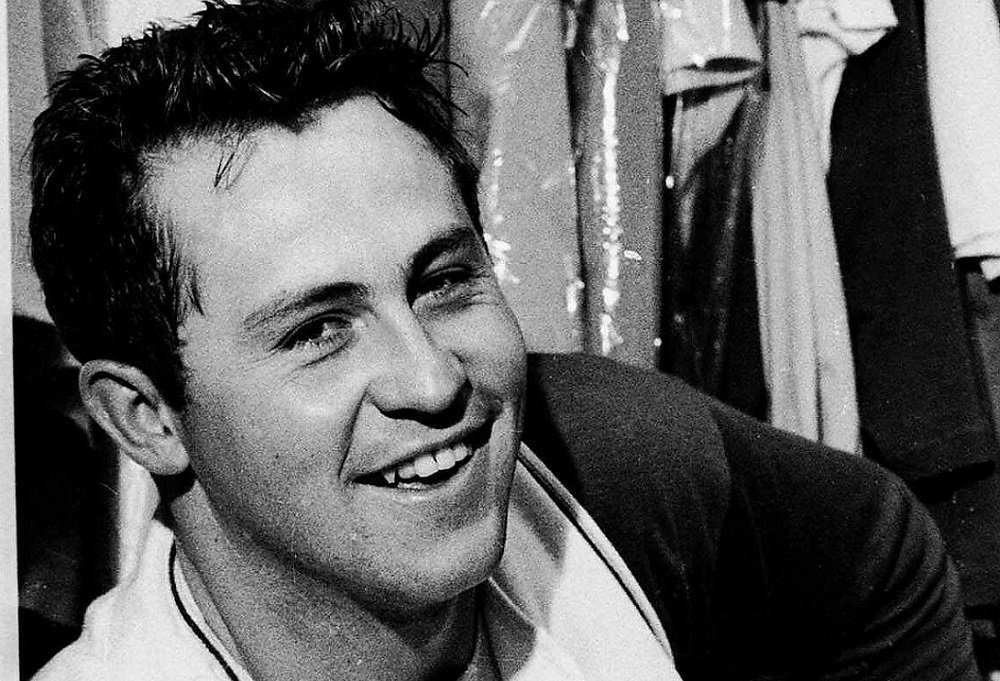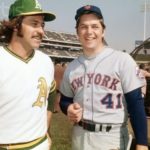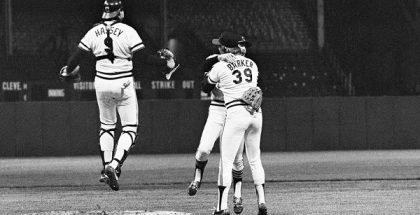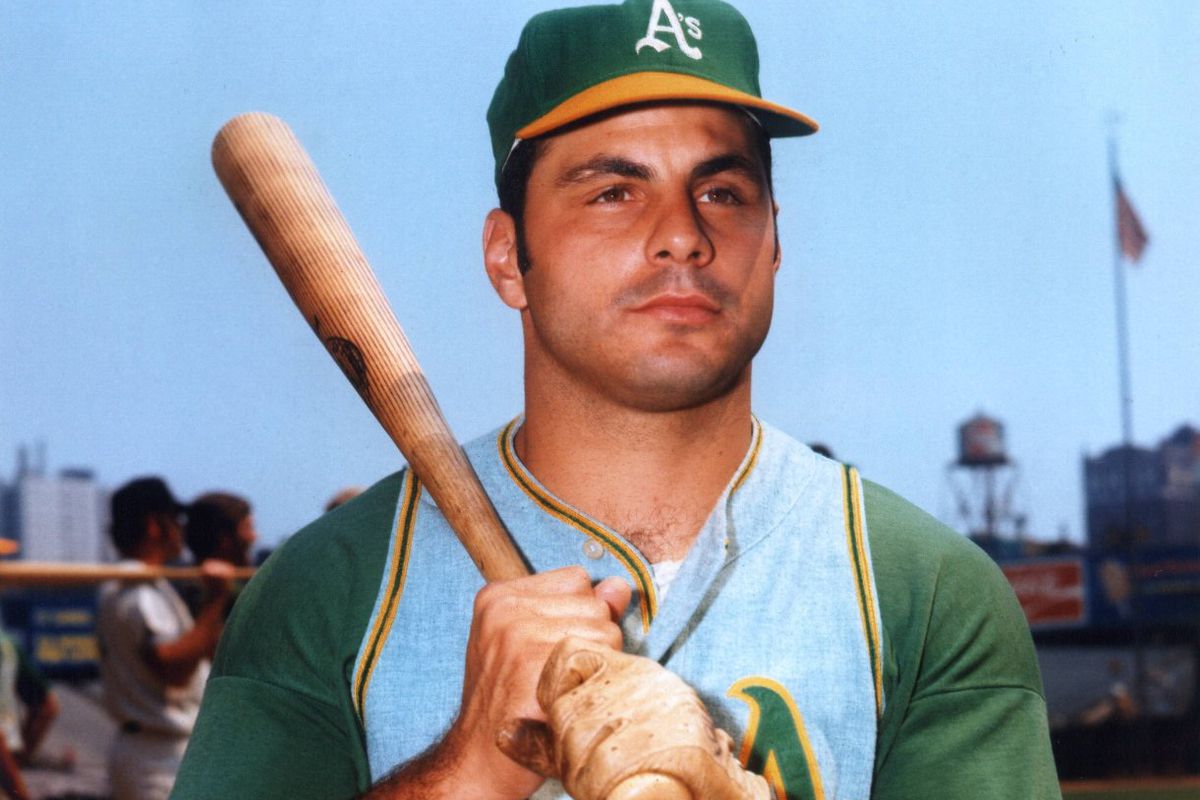Sal Bando
Position: Third Baseman
Bats: Right • Throws: Right
6-0, 195lb (183cm, 88kg)
Born: February 13, 1944 (Age: 75-364d) in Cleveland, OH
Draft: Drafted by the Kansas City Athletics in the 6th round of the 1965 MLB June Amateur Draft from Arizona State University (Tempe, AZ).
School: Arizona State University (Tempe, AZ)
Debut: September 3, 1966 (Age 22-202d, 10,106th in MLB history)
vs. BOS 3 AB, 0 H, 0 HR, 0 RBI, 0 SB
Last Game: October 3, 1981 (Age 37-232d)
vs. DET 3 AB, 0 H, 0 HR, 0 RBI, 0 SB
Sal Bando Baseball Reference Page
Full Name: Salvatore Leonard Bando
Nicknames: Captain Sal
View Player Bio from the SABR BioProject
The captain and unquestioned leader of a raucous Oakland A’s team that reigned supreme in the baseball world from 1972 to 1974, Sal Bando provided his club with clutch hitting, solid defense, and a strong sense of purpose that helped unite the A’s not only against their opposition, but, also, against their querulous owner Charlie Finley. The power-hitting third baseman’s leadership on the field and in the clubhouse enabled Oakland to capture five consecutive A.L. West titles from 1971 to 1975, while also becoming the only team in baseball history other than the Yankees to win three straight world championships. Meanwhile, Bando topped the A’s in RBIs in three of those five years, en route to earning three top-five finishes in the league MVP voting.
Biography:
Born in Cleveland, Ohio on February 13, 1944, Salvatore Leonard Bando attended the baseball factory known as Arizona State University that also sent Rick Monday and Reggie Jackson to the Kansas City Athletics during the mid-1960s. Selected by the Athletics in the sixth round of the 1965 amateur draft, Bando spent less than two full years in the minor leagues before making his major league debut with the club on September 3, 1966. He spent the season’s final month with the A’s, before being returned to the minors for more seasoning at the end of the year. After spending most of the 1967 campaign in the minor leagues as well, Bando joined the A’s for good the following year – the franchise’s first in Oakland.
Appearing in every game for the A’s for the first of four times, Bando had a solid rookie year, driving in 67 runs and batting .251, while leading all league third basemen in putouts. Although Reggie Jackson’s 47 homers, 118 runs batted in, and league-leading 123 runs scored garnered him much of the attention in Oakland in 1969, Bando had an extremely productive sophomore season as well. The right-handed hitting Bando, who usually batted either third or fourth in the A’s lineup, batted .281 and finished among the A.L. leaders with 31 home runs, 113 runs batted in, 106 runs scored, and 111 bases on balls, en route to earning his first All-Star nomination. The solidly-built third baseman followed that up by hitting 20 homers, driving in 75 runs, scoring 93 others, batting .263, and walking a career-high 118 times in 1970.
After showing steady improvement the previous few seasons, the A’s developed into a contender in 1971. Boasting a lineup that featured Jackson, Bando, dependable leftfielder Joe Rudi, and speedy shortstop Bert Campaneris, along with a starting rotation that included Jim “Catfish” Hunter, John “Blue Moon” Odom, and A.L. Cy Young and MVP Award winner Vida Blue, Oakland quickly grew into the junior circuit’s most colorful and exciting team. The A’s captured their first of five straight Western Division titles, with Bando making key contributions to the success of the team. In addition to hitting 24 homers, driving in 94 runs, and batting .271, he played a solid, if unspectacular, third base. Bando had neither the quickness nor the reflexes of Brooks Robinson. Nor did he have the soft hands of the man nicknamed “The Human Vacuum Cleaner.” However, he played his position well, grabbing most balls hit within his reach and keeping in front of him virtually everything he failed to field cleanly.
As solidly as Bando performed on the field, he perhaps made his greatest impact in his role as team leader. Gradually assuming the mantle of team leadership as he and the rest of his young teammates grew into maturity, Bando served as the glue of the Oakland infield, providing words of encouragement and inspiration to his talented but somewhat inexperienced teammates. He also served as a buffer between the other players and team management, frequently voicing the displeasure his teammates felt towards disagreeable owner Charlie Finley. He also had no problem critiquing the team’s on-field managers, once stating after a particularly disappointing loss that A’s skipper Alvin Dark “couldn’t manage a meat market.”
After coming up short in the 1971 postseason, the A’s won the next three World Series, defeating along the way a powerful Cincinnati Reds team, a feisty New York Mets squad, and an extremely well-balanced Los Angeles Dodgers club. Bando had perhaps his finest all-around year in 1973, when he hit 29 home runs, drove in 98 runs, scored 97 others, batted a career-high .287, and led the American League with 32 doubles and 295 total bases. His outstanding performance earned him a fourth-place finish in the league MVP voting. He subsequently struggled at the plate during the postseason, batting only .167 against Baltimore in the ALCS, before posting a mark of only .231 against New York in the World Series. Nevertheless, he had an exceptional Game Two against the Orioles, hitting two homers and driving in three runs during a 6-3 Oakland win. Bando then led a protest against Charlie Finley during the World Series when he suggested his teammates wear black armbands to express their dissatisfaction with the manner in which the rambunctious A’s owner criticized second baseman Mike Andrews after he committed two errors during the team’s loss in Game Two.
Although he batted just .243 in 1974, Bando hit 22 home runs and finished second in the American League with 103 runs batted in, en route to earning a third-place finish in the league MVP balloting. He then demonstrated his ability to come through in the clutch by hitting two homers against Baltimore in the playoffs. His solo blast off Jim Palmer in Game Three provided the game’s only run, and he scored the eventual winning run in the fourth and final game on Reggie Jackson’s double – the only hit for Oakland all afternoon.
The Oakland dynasty came to an end in 1975, following the exodus of Catfish Hunter to New York. Even though Boston swept the A’s out of the playoffs, Bando did all he could to keep his team alive during the postseason, hitting a lusty .500 against Red Sox pitching. The additional departures of Reggie Jackson, Joe Rudi, and Vida Blue shortly thereafter left the A’s in a state of flux, prompting Bando to sign with the Brewers as a free agent at the conclusion of the 1976 campaign.
Bando spent five years in Milwaukee, helping the Brewers to gradually grow into a contending team as well. He had his best year in Milwaukee in 1978, when he hit 17 homers, knocked in 78 runs, scored 85 others, and batted .285. Although no longer a full-time player in his final year with the club in 1981, Bando provided veteran leadership to his younger teammates as they drove towards their first postseason appearance. Playing in all five games in Milwaukee’s first-round matchup with the New York Yankees, Bando batted .294 in the losing effort, before announcing his retirement at season’s end. He ended his career with 242 home runs, 1,039 runs batted in, 982 runs scored, 1,790 hits, a .254 batting average, and a .352 on-base percentage. Bando surpassed the 20-homer mark on six separate occasions, knocked in more than 100 runs twice, scored more than 100 runs once, and compiled an on-base percentage in excess of .400 on two separate occasions. In addition to leading the league in doubles and total bases once each, he finished second in home runs and runs batted in one time each. Bando earned four All-Star nominations over the course of his career and, upon his retirement, ranked fifth all-time among major league third basemen in games played (1,896), sixth in assists (3,720), and seventh in double plays (345).
Following his playing career, Bando became a front office executive with the Brewers. Named the team’s general manager on October 8, 1991, he proved to be less successful in that role than he was as a player. Due at least in part to payroll restrictions, Bando managed to build only one winning team in seven-plus years as GM. Team ownership finally replaced him at the helm on August 12, 1999, reassigning him to another position within the organization.
Although Bando failed in his role as general manager, former teammate Reggie Jackson paid homage to him in his autobiography, saying: “Sal Bando was the Godfather. Capo di capo. Boss of all bosses on the Oakland A’s. We all had our roles, we all contributed, but Sal was the leader and everyone knew it. He didn’t make a big deal out of it, but when something needed to be said, he said it.”

